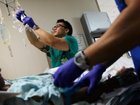Turkey's conservative government has dropped plans for a controversial bill that would have slashed the time limit for abortions; a parliamentary source told Agence France Presse on Thursday.
"The government has backed away from initial plans to curb abortion rights," the source said on condition of anonymity, adding that the Islamist-rooted government would instead seek to limit the number of Caesarean sections being performed in the country.
 Full Story
Full Story
More drugs for attention deficit hyperactivity disorder and fewer antibiotics are being prescribed to U.S. children and teenagers compared to a decade ago, said a U.S. study on Monday.
Also, contraceptive prescriptions soared 93 percent from 2002 to 2010, though the reasons for the rise remain unclear, said the research published in the journal Pediatrics.
 Full Story
Full Story
Coca-Cola CEO Muhtar Kent insists his company is not responsible for the rise in U.S. obesity despite New York Mayor Michael Bloomberg's recent moves to limit the consumption of sugary drinks.
"This is an important, complicated societal issue that we all have to work together to provide a solution," Kent told the Wall Street Journal in an interview published late Monday.
 Full Story
Full Story
A total of 46.3 million people in the United States do not have health coverage, a trend that has been rising in the past 15 years, said a U.S. survey published Tuesday.
There was good news for children in the data from the 2011 National Health Interview Survey, which showed that seven percent of U.S. youths were uninsured last year at the time of the interview, compared to 13.9 percent in 1997.
 Full Story
Full Story
Night work may increase a woman's chances of developing breast cancer by 30 percent -- a slightly elevated but "statistically significant" risk, French researchers said Tuesday.
This placed night work in the same order of risk as factors like genetic mutation, a late first pregnancy or hormonal treatment, Pascal Guenel, director of French health research body INSERM, told Agence France Presse.
 Full Story
Full Story
For people with Alzheimer's disease, a hospital stay may prove catastrophic.
People with dementia are far more likely to be hospitalized than other older adults, often for preventable reasons like an infection that wasn't noticed early enough. Hospitals can be upsetting to anyone, but consider the added fear factor if you can't remember where you are or why strangers keep poking you.
 Full Story
Full Story
The most common type of obesity surgery may increase patients' chances for alcohol abuse, according to the largest study to demonstrate a potential link.
Patients who had gastric bypass surgery faced double the risk for excessive drinking, compared with those who had a less drastic weight-loss operation.
 Full Story
Full Story
The toxic side effects of an experimental cancer drug from Onyx Pharmaceuticals may outweigh its benefits for patients with a type of blood cancer, federal health regulators said Monday.
The Food and Drug Administration warned that patients in a company study of the drug had a high rate of heart and lung side effects, some which were fatal. The FDA posted its review of carfilzomib online ahead of a meeting Wednesday, where its panel of cancer experts will recommend whether the drug should be approved.
 Full Story
Full Story
Indian pharmaceutical tycoon Yusuf Hamied revolutionized AIDS treatment more than a decade ago by supplying cut-price drugs to the world's poor -- and now he wants to do the same for cancer.
Hamied, chairman of generic drugs giant Cipla, last month slashed the cost of three medicines to fight brain, kidney and lung cancer in India, making the drugs up to more than four times cheaper.
 Full Story
Full Story
Three out of four people with mental illness in the UK are receiving no treatment, experts have said in a new report.
The report, published by the London School of Economics (LSE), says the lack of treatment for people suffering from mental health problems is the most "glaring case of health inequality" in Britain.
 Full Story
Full Story



